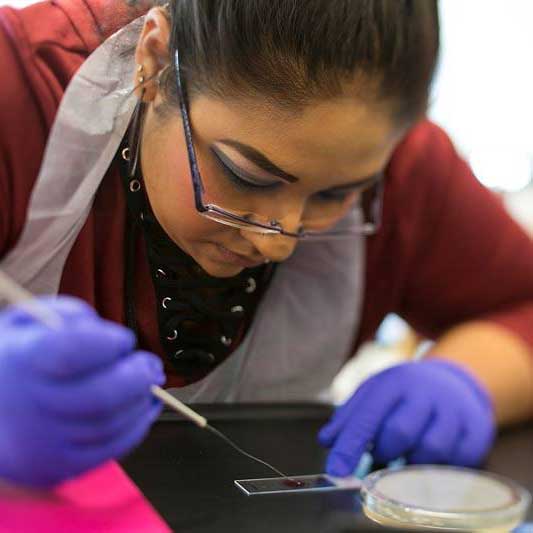Biology Program

Are you interested in learning about the living world – plants, animals, microorganisms and humans? LCCC’s Biology Program provides students with a strong foundation in life science.
The program covers a wide spectrum of disciplines, from wildlife and conservation to molecular biology and human medicine, and is ideal for students seeking to transfer to a four-year institution.
What will I learn?
Students will engage in core courses such as biology, chemistry, geology, microbiology, physics, English and math. Students will develop practical skills in scientific techniques, data analysis and critical thinking. Students have access to modern laboratories, providing an optimal environment for hands-on experiments and research. The program has opportunities for experiential learning through laboratory work, field studies and research projects.
Associate of Science
The Biology Program prepares students for careers in the dynamic and rapidly changing fields of life science. Recent advancements in molecular, cellular and computational biology have led to expanded employment opportunities for biological and life scientists. Students planning careers in biology, biochemistry, botany, conservation, ecology, forestry, medicine, microbiology, wildlife or zoology should complete this curriculum.
The successful completion of this program leads to an Associate of Science degree with anticipated transfer to a four-year program. Through the Biology Program, students will explore a range of biological science fields and can participate in authentic scientific research. Due to the diversity of opportunities, we encourage students to contact Biology program faculty for more information about how this program aligns with student’s career goals. Students interested in the sciences should consult with their advisor.
Available at the Cheyenne main campus.
What can I do with this degree?
Graduates of this program will need to continue their education at a four-year institution.
The Biology program is well suited for transfer to a Bachelor’s level degree in Biology, Biochemistry, Botany, Conservation, Ecology, Forestry, Microbiology, or Zoology. LCCC courses may transfer to institutions in addition to those with formal articulation agreements. Students are strongly encouraged to determine the degree requirements and transfer policy of the specific college/university and program to which they plan to transfer.
After earning a bachelor's or higher, graduates may find jobs as:
Visit Career Coach for additional information about Biologists.
Visit Career Coach for additional information about Molecular and Cellular Biologists.
Visit Career Coach for additional information about Environmental Science and Protection Technicians, Including Health.
Visit LCCC's Career Resources to find tools for selecting the right program for you and marketing yourself to future employers.
Cost of Attendance
For general college expenses, students should view LCCC’s cost of attendance. Additional estimated expenses for the science programs are: class/lab fees*: $600













